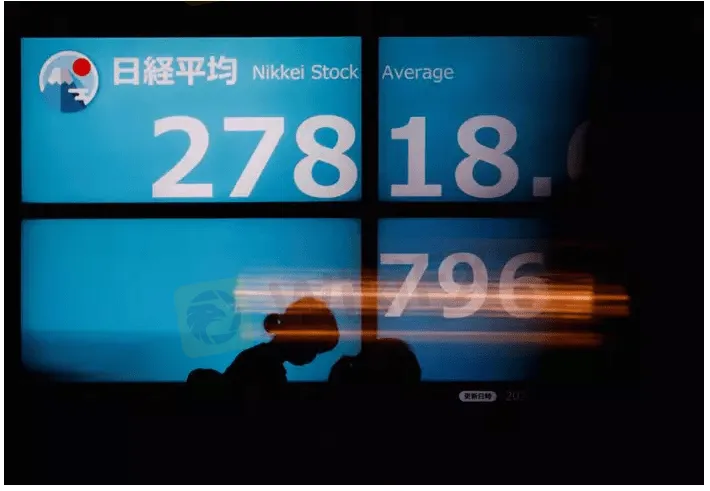简体中文
繁體中文
English
Pусский
日本語
ภาษาไทย
Tiếng Việt
Bahasa Indonesia
Español
हिन्दी
Filippiiniläinen
Français
Deutsch
Português
Türkçe
한국어
العربية
Stocks subdued by rate hike risks, yen steady
Abstract:Asia’s stockmarkets were steady but fragile on Thursday, a day after their biggest drawdown in three months as investors weighed the risk of the Federal Reserve announcing a 100 basis point interest rate hike next week to tackle sticky inflation.

The Japanese yen loitered just above recent lows, riding a boost from the strongest hints yet of possible market intervention by Japanese authorities. The New Zealand dollar jumped a bit on better-than-expected growth data.
MSCI‘s broadest index of Asia-Pacific shares outside Japan rose 0.4% and Japan’s Nikkei rose 0.3%.
“Equity markets are presently in no-mans land,” said Sean Darby, global equity strategist at Jefferies in Hong Kong.
“Better macro news to support earnings is discounted as the need for further tightening to quash growth – while CPI prints are not declining fast enough,” he said.
“The best metaphor is that the Fed is not only driving the economy using a rear view mirror but is now being forced to press the ‘rate rise’ accelerator just as bond markets are discounting an overtightening.”
Fed funds futures, which were dumped along with stocks after Tuesdays stubbornly hot U.S. inflation reading, imply a 37% chance of a 100 basis point rate hike next week and have the benchmark U.S. interest rate about 4.3% by February.
Treasuries were calm in Tokyo trade on Thursday, but the U.S. yield curve is deeply inverted – often a signal of a looming recession – as investors believe that rate hikes through this year and next will take a bite out of future growth. [US/]
Two-year yields, which track near-term rate expectations, were steady at 3.7860%, up 22 basis points this week for a seventh straight weekly gain. The benchmark 10-year yield was at 3.4062%.
“(There are) two opposing forces for the 10-year note – the upward pressure from Fed hikes and downward pressure from a potential economic downturn in the future,” said NatWest Markets U.S. rates strategist Jan Nevruzi.
“We are more firmly in the camp that more hikes today increase the odds for a deeper recession.”
Line in the sand
One bright patch on Thursday was Chinas beleaguered property sector, with news reports on forthcoming government support lifting a Hong Kong index of mainland developers 6.5%. The broader Hang Seng rose 0.8%. [.HK]
In currency markets, the U.S. inflation shock and expectation of rate hikes in response has sent the greenback up to re-test recent multi-decade highs. Thursday moves were modest with the euro steady at $0.9978 and the Aussie taking a small lift to $0.6754 after some mixed employment data. [AUD/]
The yen, pounded some 20% lower against the dollar this year, bounced off its lows a day ago when the Bank of Japan checked dollar/yen rates with banks around the 145 yen per dollar level – a possible prelude to yen buying. It was last at 143.05 per dollar.
“I certainly dont want to be the one to stand here and suggest that this is the line in the sand,” Shafali Sachdev, head of FX, fixed income and commodities for Asia at BNP Paribas Wealth Management in Singapore.
“But whats clear is that the market is wary of the level, and has tried to test the level a few times which seems to suggest that if it breaks, it may overshoot quite rapidly.”
Thursday data showed Japan posted a record trade deficit in August – aggravated by the yens slide, but also yet another weight on the currency.
Later in the day European trade data is due and Chinese President Xi Jinping meets Russias Vladimir Putin in Uzbekistan.

Disclaimer:
The views in this article only represent the author's personal views, and do not constitute investment advice on this platform. This platform does not guarantee the accuracy, completeness and timeliness of the information in the article, and will not be liable for any loss caused by the use of or reliance on the information in the article.
Read more

The Withdrawal Trap: How Scam Brokers Lure Victims into Paying More
In the world of online trading, the promise of quick profits and seamless transactions often masks a darker reality. One of the most insidious tactics employed by fraudulent brokers is blocking withdrawals, that is a deliberate strategy designed to trap traders and investors into paying more money under false pretences.

Common Tactics Used in Online Trading Fraud Today
Know the top online trading scams of 2025, from fake apps to pump-and-dump tricks. Simple tips to spot and avoid them, keeping your money safe in this easy guide.

RM1.29 Million Lost in ‘C Baird VIP’ WhatsApp Scam
A 43-year-old company auditor and subcontractor in Malaysia became the latest victim of an elaborate investment scam after losing RM1.29 million to a fraudulent scheme promoted via WhatsApp.

U.S. March ISM Manufacturing PMI Released
The U.S. March ISM Manufacturing PMI data shows that manufacturing has contracted for the first time, and investors should pay attention to future changes and impacts on the sector.
WikiFX Broker
Latest News
Exposing the Top 5 Scam Brokers of March 2025: A Closer Look by WikiFX
Gold Prices Climb Again – Have Investors Seized the Opportunity?
Webull Launches SMSF Investment Platform with Zero Fees
Australian Regulator Warns of Money Laundering and Fraud Risks in Crypto ATMs
The Withdrawal Trap: How Scam Brokers Lure Victims into Paying More
FCA to Investors: Think Twice Before Trusting These Brokers
Trump\s tariffs: How could they affect the UK and your money
Trump gambles it all on global tariffs he\s wanted for decades
HTFX Spreads Joy During Eid Charity Event in Jakarta
How Will the Market React at a Crucial Turning Point?
Currency Calculator







